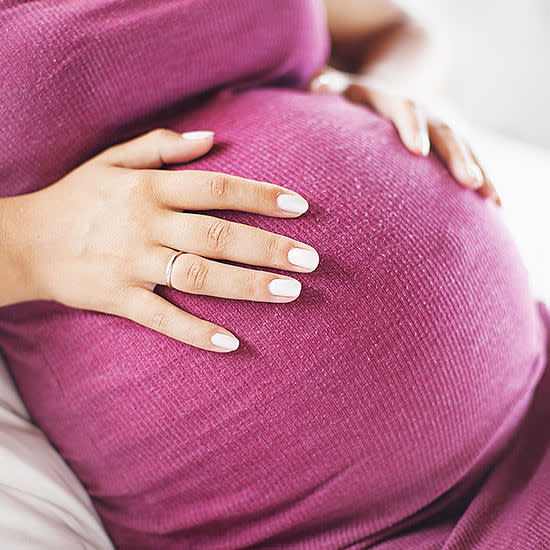Pregnancy Advice: Old Wives Tales Vs. Science

When it comes to pregnancy counsel, female family members, pregnant friends and even experienced moms don't always know best. Yet many expectant women are more apt to listen to those sources than they are to follow medical advice, a 2010 study published in the Journal of Health Psychology found.
"Women wanted to place scientific advice above that of their mothers and grandmothers," says study author Paula Nicolson, Ph.d., a professor of health and social science at the University of London. "However, on an everyday basis, many opted for the family advice."
To help you separate pregnancy facts from fiction, we examine the science (or lack there of) behind several common beliefs. see if you can tell the difference.
RELATED: What's the Weirdest Pregnancy Advice YOU'VE Ever Gotten?!
Old Wives Tale Or Science?
Answer: Old Wives Tale
Bad news for the 70 percent of pregnant women who experience nausea and vomiting in early pregnancy: There is no truly reliable treatment for morning sickness. Authors of a Cochrane systematic review analyzed 27 studies involving more than 4,000 pregnant women and found that not a single commonly used remedy, including ginger, acupuncture, acupressure, vitamin B6 and anti-nausea drugs, could be deemed effective.
"[In this analysis] we found little evidence to support these popular therapies," says study co-author Dónal O'Mathúna, Ph.d., a senior lecturer at Dublin City University school of Nursing in ireland. But this doesn't mean you shouldn't try them (or any other safe treatments OK'd by your doctor). "Some of these therapies might work for some women," O'Mathúna says. Plus, the placebo effect can be very powerful.
RELATED: 15 Tips for Dealing with Morning Sickness
Old Wives Tale Or Science?
Answer: Science
"Folksy" sounding but true. Researchers at Johns Hopkins Hospital in Baltimore found that when pregnant women reported moderate heartburn, they had hairy newborns 82 percent of the time; the majority of heartburn-free women gave birth to bald babies.
Surprised? So was the study's lead author, Kathleen a. Costigan, R.N., M.P.H., director of the hospital's Fetal Assessment Center. "I had heard this old wives' tale hundreds of times and used to tell my patients it was nonsense," she says. "We undertook this study thinking that we would debunk the myth!" Researchers surmise that higher levels of estrogen and progesterone, the pregnancy hormones that stimulate fetal hair growth, also relax the esophageal sphincter, allowing stomach acid to back up into the esophagus and cause gastric reflux, aka heartburn.
RELATED: 5 Foods That Cause Heartburn During Pregnancy
Old Wives Tale Or Science?
Answer: Science
The foods and drinks you ingest flavor the amniotic fluid that the fetus starts swallowing in the second trimester. Science has shown that babies who are exposed to vegetables in utero are more likely to develop a preference for them when they begin eating solids and as they grow into adults.
Flavors from your diet are also transmitted through your breast milk. One study published in Pediatrics showed that 4- to 8-month-olds whose nursing moms ate green beans accepted the vegetable more readily and ate three times more of them than did babies who were not exposed to them. Your baby can even learn to like bitter-tasting varieties like kale if you eat them regularly during pregnancy. Unfortunately, the same holds true for cookies, chips and other no-nutrient snacks: recent research discovered that when pregnant rats ate diets high in sugar and fat, their babies were more likely to become junk-food junkies themselves.
RELATED: Got Junk Food Pregnancy Cravings?
Old Wives Tale Or Science?
Answer: Old Wives Tale
Many pregnant women are told that getting an epidural will lead to having a sluggish newborn who has difficulty breastfeeding. a British study published in a 2010 issue of Anaesthesia debunks this myth. scientists compared the breastfeeding success rates of 1,054 women, 351 of whom delivered without an epidural. The results? No significant difference in breastfeeding success.
"Epidurals are very safe and can turn a difficult labor experience into a very rewarding one," says study co-author Andrew Shennan, M.D., professor of obstetrics at King's College London. "Under these circumstances, establishment of breastfeeding could be much easier after an epidural."
RELATED: 7 Facts About Epidural Side Effects
Old Wives Tale Or Science?
Answer: Old Wives Tale
Even if you've had two previous C-sections, you can go ahead and try to deliver the old-fashioned way. in 2010, the american College of Obstetricians and Gynecologists revised its guidelines on vaginal birth after Cesarean (VBAC), determining that VBACs are a safe and appropriate option for most women. in the last few decades, doctors worried that because of their incision scar, women with previous C-sections were at a higher risk for uterine rupture, which is dangerous for both mother and baby.
Consequently, some hospitals and insurers restricted VBACs, and in 2006 to 2007 the VBAC rate fell to 8.5 percent while the C-section rate rose to 31 percent. Then in 2010, the National institutes of Health compiled a state-of-the-science report based on major VBAC studies of more than 20,000 women. The consensus: The risk of uterine rupture during a "trial of labor after Cesarean" is very low—between 0.5 percent and 0.9 percent.
